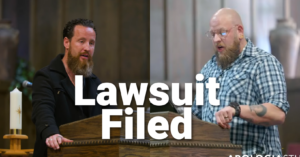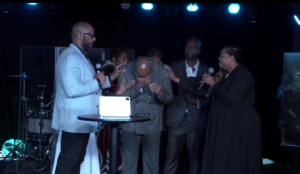Doug Wilson’s “No Quarter November” is giving no quarter to reformed teaching on the Lord’s Supper. In “The Challenge of Child Communion,” he argues that baptized toddlers (and possibly infants?) should receive communion. His central line is simple enough:
“If the baptized child is genuinely part of the loaf, then he should partake of the loaf.”
It’s a striking sentence, and a revealing one. Because once you follow the logic behind it, you quickly discover that Wilson’s case depends not on historic Reformed theology, but on the same Federal Vision aberrations that the Reformed world has consistently rejected.
Once these assumptions are removed, the biblical and historic Reformed position reveals itself once again: the Table is for those who can discern the Lord’s body, repent of sin, and profess Christ with understanding. Despite my unapologetic Baptist commitments, this isn’t a Baptist argument. This is the Westminster. This is Calvin, Ursinus, Bannerman, and Warfield.
This is plain tradition before Federal Vision theology ham-handedly attempted to rewire Reformed theology.
The Westminster Larger Catechism 177 draws an obvious line, teaching that, while baptism may be administered to infants, the Lord’s Supper may only be administered to those “of years and ability to examine themselves.” WLC 171 teaches that everyone taking communion be capable of “knowledge to discern the Lord’s body,” “faith to feed upon Him,” “repentance,” “love,” and “new obedience.” No matter how reliably a two-year-old responds to questions in church with, “Jeezusss,” infants, toddlers, and very young children simply cannot meet the requirements God Himself places on the Supper. That is why no confessional Presbyterian denomination—including the PCA, OPC, ARP, and RPCNA—has ever embraced paedo-communion. Not once.
If paedo-communion were truly “Reformed,” the churches that wrote the Westminster Standards would have practiced it.
Wilson’s sacramental logic should be familiar to anyone who watched the Federal Vision debates in the early 2000s, where FVers argued that, if baptism makes a child objectively part of the covenant, then the child objectively shares in Christ, and therefore the child should receive the Supper.
That’s not Calvin. That’s not Westminster. That’s Federal Vision.
Calvin says plainly:
“Not all who are baptized into Christ put on Christ.” (Institutes 4.16.31)
Ursinus adds:
“Children cannot examine themselves or discern the Lord’s body.” (Commentary on Heidelberg Catechism, Q. 74)
And Warfield concludes:
“The Supper is for the instructed believer alone.”
The historic Reformed tradition has always required a credible profession of faith for communion—not because of sneaky Baptist influence, but because Scripture requires it.
1 Corinthians 11 Still Says What It Says
Wilson attempts to blunt Paul’s warnings by shifting the emphasis away from personal examination to merely recognizing the corporate body:
“Paul’s rebuke is not about private introspection.”
This mirrors FV’s teaching that there are essentially two elect people of God – those conferred all the corporate benefits of Christ (election, calling, regeneration, faith, union with Christ, and adoption), and those who retain these benefits through “cooperation with grace” in their life and are therefore actually saved. This is not, despite the claims of some, the same as Lordship Salvation – it is much closer to the two-part, final justification believed by Wilson’s favorite author G.K. Chesterton (Wilson is comfortable referring to Catholics as “Christians” under the “corporate covenant” framework).
Yet Calvin’s commentary, Bannerman’s ecclesiology, and every major Presbyterian exposition disagree. They insist Paul demands personal self-examination, personal repentance, personal discernment, and personal faith in Christ. This is the plain meaning of 1 Corinthians 11:28–29, no matter how Federal Vision attempts to impose its redefinitions.
A Question Wilson Doesn’t Answer
If baptized children are fully “in the loaf” (partaking in the corporate, efficacious benefits of the covenant family), why does Wilson’s own church not treat them as part of the loaf? You know, members? Yet they can’t vote. They cannot participate in discipline. They cannot exercise the keys of the kingdom. They cannot make or affirm doctrinal commitments.
Wilson grants toddlers sacramental inclusion but not ecclesiastical participation. This illogic and inconsistency doesn’t exist in confessional Presbyterianism. Nor in historic Protestantism. Both insist that sacramental participation and church participation require the same thing: a credible profession of faith accepted by the church.
The Real Problem Isn’t Fencing the Table. It’s Failing to Disciple Our Kids.
Wilson is right about one thing: churches today are not keeping their children. But the cure is not sacramental shortcuts. It’s what the Reformers actually prescribed: catechizing children, keeping them in gathered worship, calling them to repentance and faith, walking with them toward a credible profession, and embracing them fully when that profession is made.
That is how the Reformation has been historically practiced. That is how Protestants have preserved the faith for their sons and daughters. And that is why paedo-communion has never been part of the Reformed mainstream.
The path forward is not paedo-communion. It is the ordinary, biblical, historic means that God has always blessed: Word, gospel, catechesis, discipline, prayer, worship, repentance, and faith.
Calvin taught this. Westminster taught this. Every major Reformed theologian taught this.
Only Federal Vision didn’t.























4 responses to “Federal Vision November”
Good essay.
For people who want to read some more about the Federal Vision, I have some resources that I created back 15-18 years ago here, which are still relevant: https://mothwo.blogspot.com/search/label/Federal%20Vision
Doug Wilson seems to love driving his theological chariot as close to the line between orthodoxy and heresy as he can without going over it. Sadly, his influence on many reformed churches has been far more detrimental than delightful.
“Wilson is right about one thing: churches today are not keeping their children. But the cure is not sacramental shortcuts. It’s what the Reformers actually prescribed: catechizing children, keeping them in gathered worship, calling them to repentance and faith, walking with them toward a credible profession, and embracing them fully when that profession is made.”
This right here is the crux of the issue. We keep our children in service. Children’s church, in my opinion, should not be a thing. They should stay with the congregation. We’ve always kept our kids with us even at a church that has children’s church. Our kids partake of the table because they know the gospel. They know what sin is, what repentance is, how to articulate the gospel. We catechize our children. That’s how it should be.
I think a lot of churches should take Jesus’ words to heart when he said, “Hinder not the children to come to me.” I’m not saying toddlers and babies should take communion because they shouldn’t. But I think a lot of children understand the gospel and understand what sin and repentance is. And to fence them from the table is a hindrance to their spiritual growth rather than helpful.
A few years ago my wife started getting into Doug Wilson’s teachings as well as that of many of those in his universe. I’ve never liked Wilson, but I need some current resources that will help me examine the problems with FV so I can start to help my wife ditch the things she’s picked up. Any suggestions?